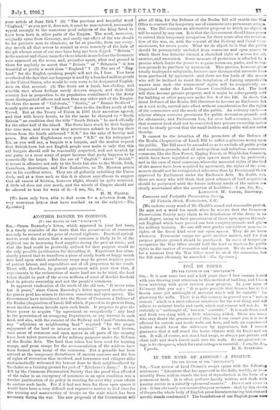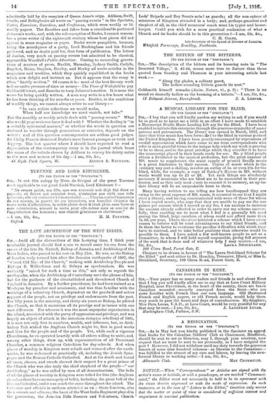IN THE NAME OF ADDISON !—A PROTEST. [To THE EDITOR
Or THE " SPECTATOR."' SER,—Your review of Lord Cromer's essays opens with the following sentences : "Literature that has appeared in the daily, weekly, or oven monthly Press seldom stands the test of reproduction in the form of a permanent book. It is often perforce hastily written, and deals with passing events in a suitably ephemeral manner." Does it not occur to you—it has obviously not occurred toyour reviewer—that by this stroke of the pen the whole body of English prose literature (saving histories and novels) stands condemned The foundations of our English prow ware admittedly laid by the essayists of Queen Anne's reign. Addison, Swift, Steele, and Bolingbroke all wrote OD "passing events" in the Spectator, Tatter, Examiner, Guardian, and Craftsman, which wore weekly or bi- weekly papers. The Ramblers and Idlers form a considerable portion of Johnson's works, and, with the sole exception of Burke, I cannot remem- ber a prose writer of the eighteenth century whose best pieces did not appear in some magazine or paper. Burke wrote pamphlets, because, being the mouthpiece of a party, Lord Rockingham and his friends preferred, and no doubt paid for, that form of publication. The letters of Junius, very much on passing events but admitted to be classical, appeared in Woodfall's Public Advertiser. Coming to succeeding genera- tions of masters of prose, Hazlitt, Macaulay, Sydney Smith, Carlyle, Bagohot, Maine, Stephen, Huxley, and Morley all wrote articles in the magazines and weeklies, which they quickly republished in the books which now delight and instruct us. But it appears that the essay is often "hastily written." Of course it is : most of the best literary work Is done under pressure of time or money—The Vicar of IVakefield to pay Goldsmith's rent, and Rasselas to bury Johnson's mother. It is none the worse for being quickly written. A man may write in a few hours what he has been thinking of for months or years. Besides, in the conditions of worldly things, we cannot always retire to our library :—
" In vain sedate reflections we would make, When half our knowledge we must snatch, not take."
But the monthly or weekly article deals with "passing events." What else would your reviewer have it deal with ? Whether the dealing is "in a suitably ephemeral manner," or whether the words in question are destined to wander through generations or centuries, depends on the writer: and of this question contemporaries are seldom good judges. Sir Philip Francis dismissed Burke's most famous passages as trash and 'orrery. The last quarter where I should have expected to read a depreciation of the contemporary essay is in the journal which hears the name of the vehicle chosen by Addison to convey his dainty satire to the men and women of his day.—I am, Sir, &c.,











































 Previous page
Previous page